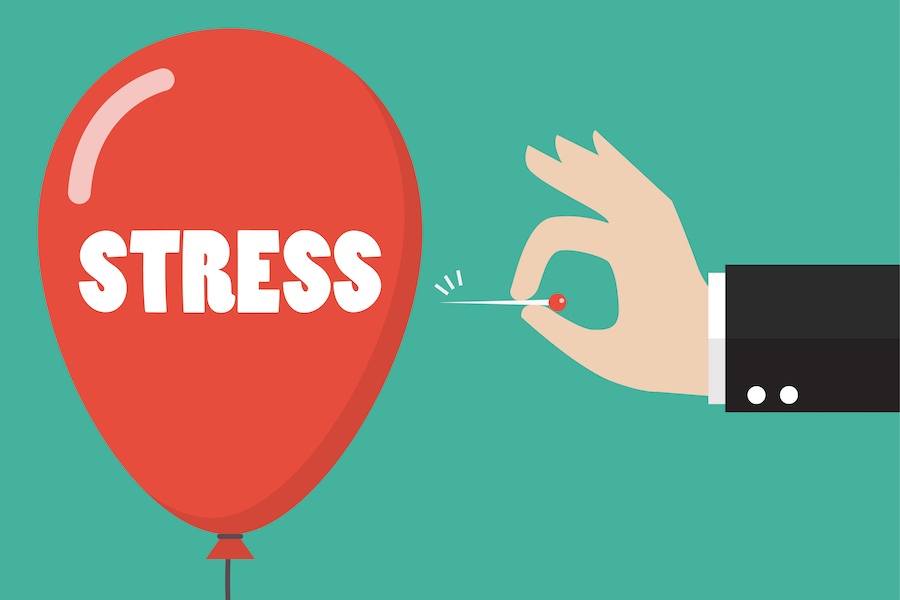Stress awareness month is a good time to remind staff to relax: Here's 4 tips to help

When you’re under a lot of stress, it can make you physically ill. It’s linked to heart disease, immune disorders, strokes, IBS—and it can even make your teeth fall out (those anxiety dreams may have something to them after all).
Stress also has a serious effect on the ability to think clearly. When pressure is looming, the mind becomes clouded. Here are a few ways to beat back stress, and sharpen your mind for the tasks ahead.
- Exercise
According to research2, just under a third of British people use exercise to reduce the pressure they feel. It’s a great way to get rid of pent-up stresses—spending half an hour hitting a bag in the gym is relieving, and has the added benefit of improving your physical health as well.
Exercise lowers your body’s level of stress hormones, replacing them with endorphins. Exercising regularly will boost your confidence, help you get more sleep, and is proven to reduce anxiety3. - Reduce caffeine
Coffee, tea and soft drinks mostly contain this drug—and it is a drug. We all know someone who seemingly can’t function without a heavy caffeine hit in the morning. But some studies4 say it could be a contributor to stress, and anecdotally we’ve all felt the 1pm slump of a caffeine crash.
Switching to water or, if you can’t give up the flavour, decaffeinated drinks, can make a huge difference to this. You’ll feel more hydrated, refreshed and ready to go after a big glass of ice-cold water in the morning. Give it a try. - Say ‘no’
If you’re overloaded with tasks and obligations, learning to say no can make a huge difference to your life at work and home. When your plates are piled too high, it’s easy to get sick.
Not everyone works the same way. Just because someone you know can handle 15 tasks at once doesn’t mean you should feel obliged to keep up. Set yourself a maximum workload and stick with it—saying no isn’t selfish, and always saying yes is detrimental to health. When you take a little more control, you’ll find that stress diminishes. - Practice mindfulness
Living in the now, and focusing on nothing but the present moment—that’s mindfulness. When you’re tuned in and aware of the present, without thinking about past or future events, you can reduce stress, improve mood5—and importantly, rejuvenate your focus.
It’s as simple as taking time to breathe. Spend a few minutes in a quiet place focusing on breathing deeply, in and out, without letting any other thoughts in.
There are lots of resources and courses available to teach proper mindfulness6 for stress—look into them, and take the plunge. Let’s make this Stress Awareness month as calm and stress-free as possible.
This article is provided by Health Assured.
References
- The stress Management Society, National Stress Awareness Month 2019
-
Regular exercise, anxiety, depression and personality: A population-based study; M.H.M.De MoorA.L.BeemJ.H.StubbeD.I.BoomsmaE.J.C.De Geus; Department of Biological Psychology, Vrije Universiteit, van der Boechorststraat 1, 1081 BT, Amsterdam, The Netherlands; 24 January 2006.
-
Caffeine consumption and self-assessed stress, anxiety, and depression in secondary school children; Gareth Richards and Andrew Smith; Journal of Psychopharmacol, December 2015
-
Mindfulness: An Effective Prescription for Depression and Anxiety; LindsayMaxwellMN, NPElsieDuffPhD(c), NP; The Journal of Nurse Practitioners; 30 March 2016.
If you'd like to further develop your knowledge about employee wellbeing, a day at the Employee Wellbeing Congress on 20 June in London, is the essential event for you.
Supplied by REBA Associate Member, Health Assured
Health Assured is the UK and Ireland's most trusted health and wellbeing network.







